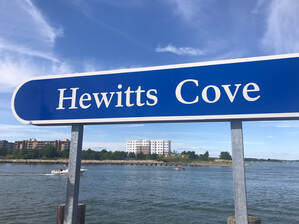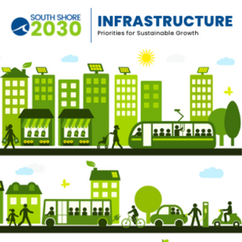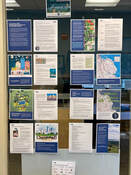But the state is facing a real challenge on workforce and housing which needs to be addressed with some broad strokes. Chambers and business groups need to help our communities get to “yes” on housing in ways that preserve unique community characteristics and promote our future. Thank you to Marshfield Community Media for recording the event. More photos can be found here! Event Sponsor:
1 Comment
We want to update you on the former South Weymouth Air Base, also known as Union Point or Southfield. A critical decision will be made by the Rockland Town Meeting on Tuesday, November 7 at 7:00 P.M.
The new development team (New England Development and Brookfield Properties) has proposed a plan that moves this critical project forward. The plan will not move ahead without rezoning. Weymouth Town Council and Abington Town Meeting, as well as the Southfield Redevelopment Authority, all have already approved the necessary rezoning plan. Now it is up to Rockland Town Meeting to approve it or stop a project that will benefit the entire region-including Rockland. Only Rockland residents can vote or speak at the meeting, which starts at 7:00 at Rockland High School Auditorium. If you or your employees want to see economic opportunity and growth, we encourage you to attend. Download information about this special town meeting. Rockland will gain a lot of new money for local services from the project. But, with almost every project there are opponents who see growth and change as something bad. The new developers have impressive credentials and successful local projects such as Pinehills in Plymouth and University Station in Westwood. Their new zoning proposal plan, connecting runways to greenways, offers more open space, more homes, and more local tax revenue than previous plans. It also includes mixed used for retail and commercial. The South Shore Chamber of Commerce has long identified the former Base as the most important economic opportunity for the three communities and the surrounding area. The project has a long way to go. Major infrastructure issues have to be addressed. However, the developers and state will not get to that step without having a viable zoning plan in place. On Tuesday night, only Rockland residents will have a voice in deciding on a successful project, with a top development team that has local roots, or a partially built neighborhood with an uncertain future and lost opportunities. The former Base has been closed for 25 years, this is the right plan, the right team, and maybe the last chance to see a great project. Please feel free to share with any Rockland residents.  If you live, work or play in Southeastern Massachusetts, you know our region offers something wonderful for everyone. In a changing world, we must keep our economy strong to ensure our people and places are here for decades to come. That's why the Chamber's South Shore 2030 plan was created. South Shore 2030: Choosing our Future is our constantly evolving roadmap that guides smart, informed planning decisions. A local team of large and small business leaders, nonprofit leaders, elected officials, and policy experts are building and implementing a plan to promote our region's economic future. Our mission is to create the right environment and balance for our current and future businesses and resident workforce to thrive. Key Accomplishments
2022 HighlightsLearn more about how we drove economic development in the region. Release of South Shore 2030 Infrastructure Priorities Report
The South Shore Chamber of Commerce opposes Question 1 on the November Ballot. The proposed constitutional amendment imposes an additional 4% tax on any income over $1 million. Any future change or repeal will require another constitutional amendment – a process that can run from 30 months to many years. The chamber is concerned about how this may discourage people from moving here or opening a business in Massachusetts. The state already sees some of its wealthier residents leaving for states with more favorable taxes. An 80% increase in taxes (from 5% to 9%) on income over $1 million will not help. The need to permanently raise $1-2 billion dollars in new taxes is not compelling when we have record high state tax revenues. The November ballot includes a proposed State Constitutional Amendment to tax individuals an additional 4%, above the current 5% tax, on all income over $1 million. ( 5% up to $1 million and 9% on every dollar after that.) This includes all income sources, not just salaries. It is often referred to as “the millionaires’ tax”, “fair share tax” and graduated income tax. The language suggests that the money raised will be used only for education and transportation. There is a cost-of living index applied to the $1 million so that the tax applies to slightly higher income levels than $1 million in the future.
The South Shore Chamber of Commerce opposes the ballot question. This new tax would push the state closer to the class of states considered high tax states –company we do not want to keep. It risks accelerated wealth flight - wealthier individuals moving out of high tax states to lower tax states. Evidence indicates that wealth flight is already occurring in Massachusetts, partly because of the state’s highly unfavorable estate tax (the tax when a person dies). That exodus is potentially accelerating because of the new-found acceptance of remote work. It may also discourage younger people from starting businesses here. They may not be high earners but hope to be or to build successful businesses choosing to avoid high tax states. If entrepreneurs leave the state or are discouraged from coming here, that will hurt overall economic activity and job creation. Wealth flight also harms our non-profits, one of the largest sources of employment in the state. Their missions and services are an important part of the region’s quality of life. Most of these organizations depend on the generosity of a relatively small number of wealthy people for a large part of their annual charitable giving. A loss of donor/local philanthropists will reduce support for our non-profit’s missions and the related jobs. Th Chamber is not persuaded by proponents on the need for this large tax increase. They argue:
For more information on both sides of the proposal please see https://noquestion1.com/ (opponent’s coalition group) https://www.fairsharema.com (supporter’s coalition group) The Proposed Amendment to the State Constitution To provide the resources for quality public education and affordable public colleges and universities, and for the repair and maintenance of roads, bridges and public transportation, all revenues received in accordance with this paragraph shall be expended, subject to appropriation, only for these purposes. In addition to the taxes on income otherwise authorized under this Article, there shall be an additional tax of 4 percent on that portion of annual taxable income in excess of $1,000,000 (one million dollars) reported on any return related to those taxes. To ensure that this additional tax continues to apply only to the commonwealth’s highest income taxpayers, this $1,000,000 (one million dollars) income level shall be adjusted annually to reflect any increases in the cost of living by the same method used for federal income tax brackets. This paragraph shall apply to all tax years beginning on or after January 1, 2023. South Shore Chamber update on MBTA proposed service cuts  The MBTA proposed a series of transit cuts earlier this month in an attempt to answer some budget shortfalls due to a decrease in revenue and ridership. These proposed cuts affect Ferry Service in Hingham & Hull, as well as some bus and commuter rail service in the region. The proposed MBTA service cuts could impact far more people and interests than simply the individual riders of ferries, buses, and trains. Some of the proposals threaten the region’s economic future. Municipalities, developers, businesses, and homeowners have planned, invested, or located around long-term transit assets. The South Shore Chamber of Commerce has been engaged in dozens of public and private discussions with state and local officials as well as residents and businesses. The Chamber recognizes the financial pressure on the MBTA during the COVID-19 slowdown when people have been asked to stay at home. However, we are also looking to the recovery. We are concerned that deep cuts or elimination of services during a slowdown may mean no services during the recovery. Mass-transit services are not easily reinstated once capital and personnel changes are made. The Chamber has submitted a formal statement to the MBTA Fiscal and Management Control Board. The FMCB will be making their decisions in the next few weeks. Chamber's advocacy effortsOn November 17th, organized and led meeting with Joe Aiello, Fiscal and Management Control Board Chair for the MBTA with 50 + regional leaders, stakeholders, local officials.
Submission of an official letter to MBTA outlining concerns. See link to full letter. Creation of member sign-on letter. Chamber members can support our position and express concern by reading and signing the letter via the link provided.  FOR IMMEDIATE RELEASE ROCKLAND, MA, ISSUED AUGUST 4, 2020….The South Shore Chamber of Commerce (www.southshorechamber.org), is pleased to announce a partnership with the Metropolitan Area Planning Council (MAPC) to analyze key development opportunities on the South Shore with a $75,000 grant from MassDevelopment and $25,000 from the South Shore Chamber’s Economic Development Corporation. The Chamber will work with MAPC to conduct a high-level assessment of water and wastewater supply and demand dynamics for a number of potential growth areas in the South Shore region. This will include parts of the city of Weymouth and towns of Hanover, Hingham, Norwell and Rockland. This assessment will help to determine where water and wastewater infrastructure could be expanded to allow for more commercial and residential development. The grant is part of over $3.6 million allocated to projects in the fourth annual round of the Site Readiness Program awards. These awards provide vital resources to municipalities, private-sector businesses and nonprofit economic development entities to help overcome obstacles to developing otherwise prime locations. The program aims to boost Massachusetts’ supply of large, well-located, project-ready sites; accelerate private-sector investment in industrial and commercial projects; and support the conversion of abandoned sites and obsolete facilities into clean, actively used, tax-generating properties. “We are proud to partner with MAPC in their mission to promote smart growth and regional collaboration across the South Shore,” said Peter Forman, President and CEO of the South Shore Chamber of Commerce. “The work they do is essential for the region and is a perfect complement to our ongoing comprehensive economic and community development plan South Shore 2030.” “MAPC looks forward to building on the regional planning work that we’ve already completed with the South Shore Chamber, municipal leaders, and the private sector to facilitate thoughtful development on the South Shore,” said Betsy Cowan, Chief of Economic Development at MAPC and the coordinator for the agency’s South Shore Coalition subregion. “We know that infrastructure constraints affect development on the South Shore, and we see this as an opportunity to identify shared solutions to unlock the full potential of the region. We are grateful for the continued leadership of the South Shore Chamber and look forward to this partnership. About the South Shore Chamber of Commerce The South Shore Chamber of Commerce has long been recognized throughout the state as one of the most active and forceful advocates for the business community and numbers among the larger Chambers of Commerce nationally. The South Shore Chamber is a not-for-profit association of businesses in the communities south of Boston. It is committed to helping its members grow their businesses and to improve the business climate in the region. Members range in size from major international corporations headquartered on the South Shore to small local firms and sole proprietorships. For additional information on the Chamber, please visit www.southshorechamber.org or call 781-421-3900. About the Metropolitan Area Planning Council The Metropolitan Area Planning Council (MAPC) is the regional planning agency serving the people who live and work in the 101 cities and towns of Greater Boston. MAPC’s mission is promoting smart growth and regional collaboration. Learn more and read our blog at www.mapc.org, and follow MAPC on Twitter and Facebook @MAPCMetroBoston. Contact: [email protected] Contact: [email protected] Media: Jim Farrell, PR First, 781-681-6616, [email protected] The state’s 2011 gaming law designated certain levels and types of gaming activity in specific regions of the state. Half of the South Shore falls in Region C which includes the Cape and Islands, Bristol and Plymouth Counties. Norfolk County is in Region A. There are two categories of facilities.
The South Shore Chamber of Commerce Board of Directors recently endorsed House Bill 4070, An Act Relative to the Authority of the Massachusetts Gaming Commission, which will allow the gaming commission to consider a Category 2 license as well as a Category 1 license in the region. The Chamber covers approximately 25 communities along Route 3; about half of which are in Region C. The goal of the Expanded Gaming Act in 2011 was to promote economic development and job creation throughout the state. Specifically, this law allowed up to three destination resort casinos located in three geographically diverse regions across the state and a single slots facility at one location statewide. Today, destination resort casinos are up and running in Regions A & B, with a slots facility also operating in Region A. The Chamber is actively engaged in regional economic development work to make the area more economically competitive. This includes broadening our current economic base. We find it troubling that part of our region in Southeastern Massachusetts is almost effectively blocked under current legislation from even considering a gaming option in this area since the prospects, if any, of a full resort casino in Region C appear distant. The Chamber’s support for H 4070 is to allow consideration of options. We have not taken any position on any specific gaming proposal. We simply believe that the region should at least have some options open for new development. Likewise, it is our hope that the Commission will reopen the licensing process so proposals can be considered. Lieutenant Governor Karyn Polito joined the Chamber and South Shore Economic Development Corp. (SSEDC) leaders, Braintree Mayor Joe Sullivan, Weymouth Mayor Bob Hedlund, and area developers in a discussion held June 4 that focused on economic development and housing initiatives both generally around the Commonwealth and more specifically throughout the South Shore and the Braintree/Weymouth Landing.
Throughout the discussion, which started at Landing 53 (25 Commercial Street, Braintree), Lt. Gov. Polito discussed how the initiative, South Shore 2030, launched by the South Shore Chamber is very similar to what she and Governor Baker are looking to achieve across the Commonwealth, and how the leadership of the mayors and the business community took this vision and made it a reality at the Landing. A plan is important, she said, but without resources and partnerships, it cannot be implemented. The South Shore Chamber of Commerce is going on record in opposition to the Nov. 6th ballot Question 1 ‘Patient-to-Nurse Limits,’ a referendum, that if passed, would limit the number of patients assigned to each registered nurse in Massachusetts hospitals and certain other health care facilities.
‘The question sets a rigid staffing standard for all hospitals, in all units, at all times,’ said Peter Forman, President & CEO of the South Shore Chamber of Commerce. ‘It is an unworkable, one-size-fits-all system that imposes heavy fines, and limits the ability of doctors, nurses and hospitals to make decisions on how to care for patients; the implications for services in and outside of hospitals should concern every citizen.’ The South Shore Chamber of Commerce has long been a staunch supporter of a strong healthcare system for the region and is voicing concern that the cost of the proposed law will force hospitals to reduce some levels of care and community services. ‘The impact on our area hospitals would be significant,’ said Forman. ‘Annual costs for the South Shore Health system would be as high as $33 million, $7 million for Beth Israel Deaconess Hospital in Milton and $5 million at Beth Israel Deaconess in Plymouth.’ The law, said Forman, would also be ‘devastating’ to healthcare delivered outside of hospitals, as nurses would be drained from settings such as home care, senior care, and mental health treatment at a time when ‘treatment for mental health and opioid addiction is needed more than ever.’ |
Archives
July 2024
Categories
All
|
Upcoming Events
|
|














 RSS Feed
RSS Feed
